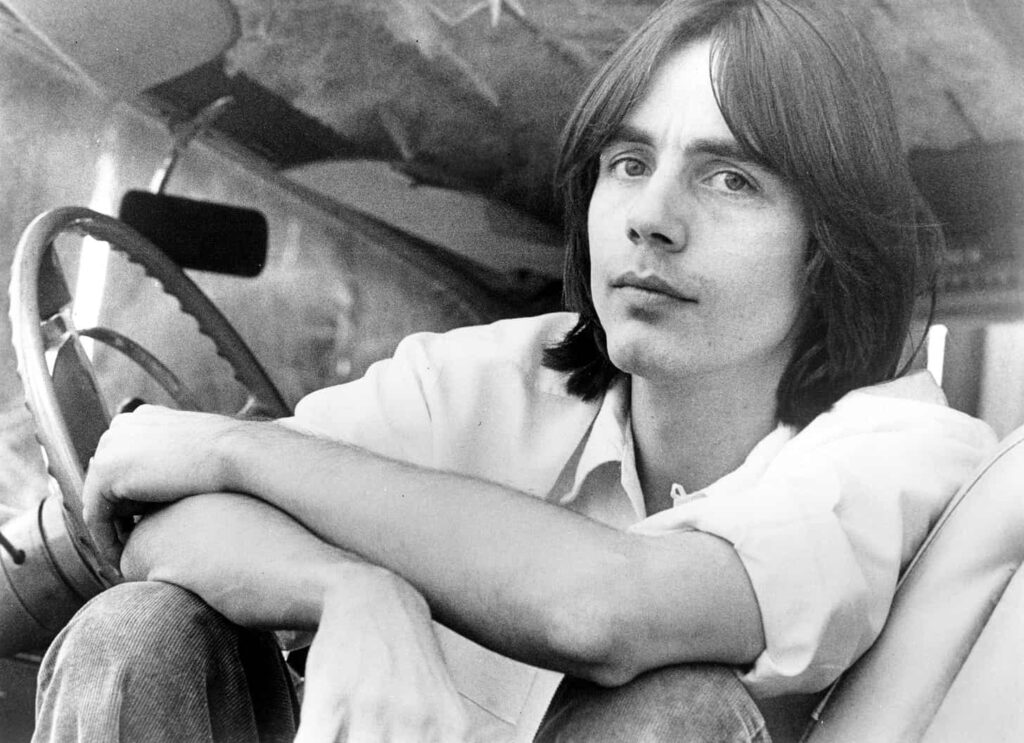
The Open Road Beckons: A Reflection on Jackson Browne’s Timeless Anthem of Perpetual Motion
Ah, Jackson Browne. The very name conjures images of sun-drenched California highways, the introspective gaze of a thoughtful songwriter, and that unmistakable voice, both tender and world-weary. In the autumn of 1977, as the leaves began to turn and a certain mellowness settled in the air, Browne gifted us with a song that resonated deeply with the times and continues to echo in the hearts of those who remember those days – “Running On Empty”. This wasn’t just another track on an album; it was the title song of a live album, a bold and somewhat unconventional move that spoke to the immediacy and the transient nature of the music itself. Upon its release, “Running On Empty” swiftly climbed the Billboard Hot 100 charts, peaking at a respectable number eleven. This chart success underscored the song’s connection with a broad audience, many of whom likely felt the pull of its central theme.
The story behind “Running On Empty” is as intriguing as the song itself. Conceived and largely recorded live on tour – in hotel rooms, on buses, and during soundchecks – the album captured a unique moment in time, blurring the lines between performance and reality. The title track, co-written with guitarist Danny Kortchmar, emerged from this very environment, reflecting the constant motion and the sometimes-disorienting experience of life on the road. Browne himself has spoken of the song as being about the feeling of being perpetually in transit, both literally and metaphorically. It’s about the exhaustion and exhilaration of chasing a dream, the sense of being caught in a cycle of movement, and perhaps the underlying fear of what might happen if the journey ever stopped.
The meaning of “Running On Empty” extends beyond the literal depiction of a musician’s life. It taps into a more universal feeling of searching, of striving, and perhaps of a certain existential unease. The lyrics paint vivid pictures of fleeting encounters, late-night drives, and the bittersweet awareness of time slipping away. Lines like “Looking out at the road rushing under my feet” and “Running on empty, running on fumes” evoke a sense of both momentum and depletion. There’s a yearning in the melody, a melancholic undertone that suggests a deeper contemplation of life’s journey and its inherent uncertainties. It’s a song that acknowledges the weariness that can accompany the pursuit of passion, the feeling of giving everything you have, even when the reserves seem low.
The “Running On Empty” album itself was a groundbreaking project. Capturing the raw energy of live performances alongside newly written songs that fit the thematic concept, it offered a glimpse behind the polished facade of studio recordings. Tracks like “The Load-Out” and “Stay”, often performed as a medley, further explored the themes of touring life, the camaraderie of the band and crew, and the poignant farewells at the end of a show. These songs, intertwined with the title track, created a cohesive narrative of life lived on the edge of performance, where the lines between the personal and the professional blurred.
Jackson Browne, with his poetic lyrics and heartfelt delivery, managed to capture a specific moment in American culture with “Running On Empty”. It became an anthem for those who felt a sense of displacement, for those who were chasing dreams across state lines, and for anyone who understood the feeling of pushing forward even when reserves were low. The song’s enduring appeal lies in its honesty and its ability to articulate a complex emotional landscape with simple yet evocative imagery. It’s a reminder that the journey itself, with all its challenges and uncertainties, is often as significant as the destination. Listening to it today, one can still feel the rumble of the tour bus, the glow of the highway lights, and the quiet contemplation of a life in motion. It’s a song that stays with you, long after the final notes have faded, a testament to the power of music to capture the essence of a particular time and a universal human experience.